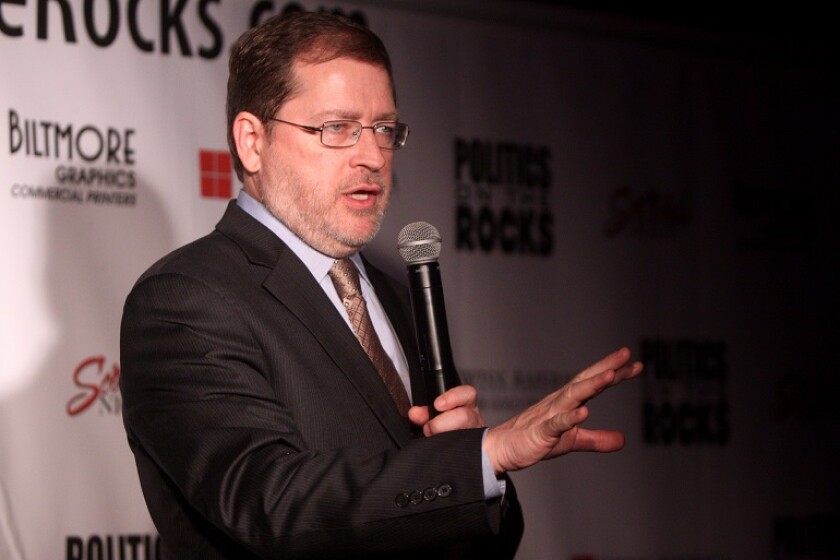Massachusetts, like several states in recent years, reengineered its gas tax so that it would keep up with inflation without any additional action required from legislators. Now the state’s voters will weigh in on whether that was the right move.
Voters narrowly favor the automatic increases, by a 45 percent to 39 percent, margin, according to a September poll by WBUR. That leaves 16 percent of respondents undecided.
The potential repeal is also an issue in the race for governor, which will be on the same November ballot as the repeal effort. Republican Charlie Baker wants the automatic hikes rolled back, while his opponent, Democrat Martha Coakley, wants to keep them.
Grover Norquist, the head of the Americans for Tax Reform, visited Massachusetts this week to build support for the repeal. Norquist had also unsuccessfully fought a similar proposal in Virginia two years ago.

The Massachusetts measure, called Question 1, pits proponents of sustainable transportation funding against advocates who want to make sure legislators don’t sneak through tax hikes without public scrutiny.
“People do not like thought of automatic tax hikes. They believe the legislature should have to vote on taxes, and no tax should automatically increase,” said Holly Robichaud, a spokesperson for the Committee to Tank Automatic Gas Tax Hikes, which supports the repeal measure. “It’s taxation without representation.”
The group is not necessarily against raising the gas tax, Robichaud said, as the increases are voted on. That is why, she said, the repeal effort only addresses the automatic increases in the 2013 law, and not the 3 cent-per-gallon gas tax hike that came along with it.
The legislation passed by the Massachusetts legislature last year was the first time since 1991 that lawmakers there had raised the gas tax. If the state’s tax had kept up with inflation since then, it would be 36 cents a gallon, rather than the 24 cents it is today.
The Committee for Safer Roads and Bridges, which wants to keep the inflation adjustments, says on its website that repealing them “would jeopardize $1 billion in transportation improvements over the next decade -- putting our public safety at further risk.”
Kristina Egan, director of Transportation for Massachusetts, which is part of the coalition supporting the automatic increases, said requiring legislators to vote on gas tax hikes every year is “impractical,” because the state legislature focuses on transportation, at most, every five or six years.
Because transportation projects typically take years to plan and build, she said, “having a predictable and stable revenue source helps us think ahead for which bridges we can repair and which we can’t afford. If you put that up for a vote every year, you’re undermining that planning process.”
Matthew Gardner, executive director of the left-leaning Institute on Taxation and Economic Policy, notes that many states in recent years have gone down the same road as Massachusetts by linking fuel taxes to inflation or prices.
“It’s been a very welcome trend in the last few years toward indexing the gas tax for some measure of inflation,” he said. “A third of the states do it, which is the best possible development for a sustainable gas tax.”
Periodically boosting the gas tax makes sure states can keep up with construction costs, Gardner said. And higher gas taxes can make sure out-of-state drivers also pay for the upkeep of roads they use, too.
He also disputed the idea that tying gas taxes to inflation is undemocratic. If legislators leave taxes flat every year without a vote, he said, it amounts to a tax break every year that lawmakers never vote on.
Florida, Maryland and New Hampshire already tie their gas tax rates to inflation, according to the conservative Tax Foundation. Maine and Wisconsin once did too, but both states repealed the automatic increases.
Other states indirectly tie their taxes to the price of gasoline. Maryland, Pennsylvania and Virginia all recently imposed or increased wholesale taxes on gas that increase as the price of fuel increases. Kentucky, North Carolina and West Virginia already taxed wholesale gasoline sales, and Nebraska’s tax rate depends on the state’s transportation needs.
One of the reasons transportation advocates have pushed for ways to automatically increase revenues is because lawmakers at both the federal and state level rarely raise them.
The federal gas tax of 18.4 cents has been in place since 1993. Twenty-four states haven’t touched their gas tax rates in more than a decade, according to ITEP. For 16 of those states, the last change was more than 20 years ago.







